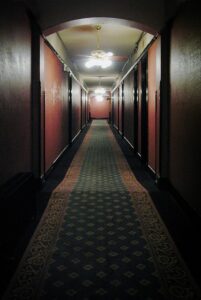
Phrases.com shows the definition of “twenty-five cent words” as “an uncommon word, often used in place of a more common one with the intent to appear sophisticated.” Something that stands out to me in my re-read of The Shining by Stephen King is the use of many fancy-shmancy words.
Perhaps ol’ Steve wanted this work to be considered a more literary read than horror. Perhaps the editor put those words in place of some better-known words that had been repeated. Either way, there are words in The Shining that I think I understand in context but don’t recognize easily. I’ll share some of the words that caused me pause.
Malefic. Color me a dork, but I gather from the name of the Disney villain Maleficent that this means something especially bad. A Google search tells me it means “causing or capable of causing harm or destruction, especially by supernatural means.”
Flambeaux. Flambe desserts are on fire when they arrive at the table, so maybe this is something on fire or lit. The “eaux” on the end helps me to know it is plural. Looking it up, the definition is “a large candlestick with several branches.”
Yaw. I know “maw” but I don’t think I know “yaw.” Similar maybe? The definition didn’t really help me: “a twisting or oscillation of a moving ship or aircraft around a vertical axis.” “Yaw” is used on page 584 of my copy in the description of an elevator’s entrance. I kind of think that really he meant “maw.” Will someone call Steve and ask if it’s a typo? Thanks.
Roque mallet. Maybe everyone else in the world knows what “roque” and “roque mallets” are, but I didn’t. If a roque mallet is going to be used as a weapon, I needed to know what it was and what it looked like to really embrace the scene in which it was used. “Roque” is apparently an American version of the game “croquet.” A roque mallet is wooden. I remember on my first read of this book, I assumed there was some metal involved in this implement, though I don’t recall why I thought that.
The biggest reason I’m calling out the twenty-five cent words is that they pull me out of the story. I, perhaps arrogantly, consider myself to be well read. It’s rare that I run across words in modern fiction that stop me.
The Shining was written, I assume, to entertain. When we write to entertain, I think we have an obligation to our readers not to dumb it down, but to make the writing approachable enough that we can create a mood that is understood.
Maybe it wasn’t written to entertain, and I need to suck it up that I didn’t know all the words. Perhaps it was intended to be a profound literary work, written in such a way as not to appeal to the masses.
Another day and time, we can get into why so many characters stutter in Stephen King’s books.

Hi Katie–
Your post highlights the importance of writing for the reader not to flex your ego. I was watching a show the other night…okay, it was RHOC…and one of the women used a twenty-five cent word that she knew none of the other women would know the meaning. Of course, she had to tell them what it meant when all of their mouths were left hanging open. I think it’s dumb. It was clear that she felt superior.
Interesting–I’ve always heard them called $10 words. And if you hated them in King, you’ll really hate reading academic analysis of literature. Holy cow–it’s like they write for the sole purpose of showing off their vocabulary. It takes 10 times longer to read such a document than anything else of the same length.
I’ve been accused of the same crime (using $0.25 words), many times. More than one of my readers have told me they had to use the dictionary on their kindles while reading.
I have to admit that it isn’t intentional. I’ve been a voracious reader all my life. To ME those words feel more commonplace than they may seem to other people and often the $0.25 word has a shade of meaning that is more accurate than a more common word, which to me just seems right.
I have, on occasion, had my editors tell me to drop a word in favor of a more common one. In nearly every case I take their advice, because the editors I hire are better educated about grammar and usage than I am. (One of my editors frequently quotes different texts to back up his claim and slowly over the years I’ve learned a ton. Comma usage is still my nemesis, however.)
I’m still learning new words every day. I love the kindle feature of pressing and holding a word to see the definition. And… I’ve even caught myself doing the same thing to a physical book. LOL.
King does have a big vocabulary. I know a lot of words, and some of them caught my notice, although they weren’t bothersome. I’ve never heard of roque either. But if the mallet was anything like our croquet mallets in the set we had when I was a kid, I wondered how it could do so much damage to poor Dick Hallorann without breaking; they’re not THAT sturdy… When I come across a word I don’t know if a novel, I look it up. And if it’s a good one, I try to work it into my WIP.